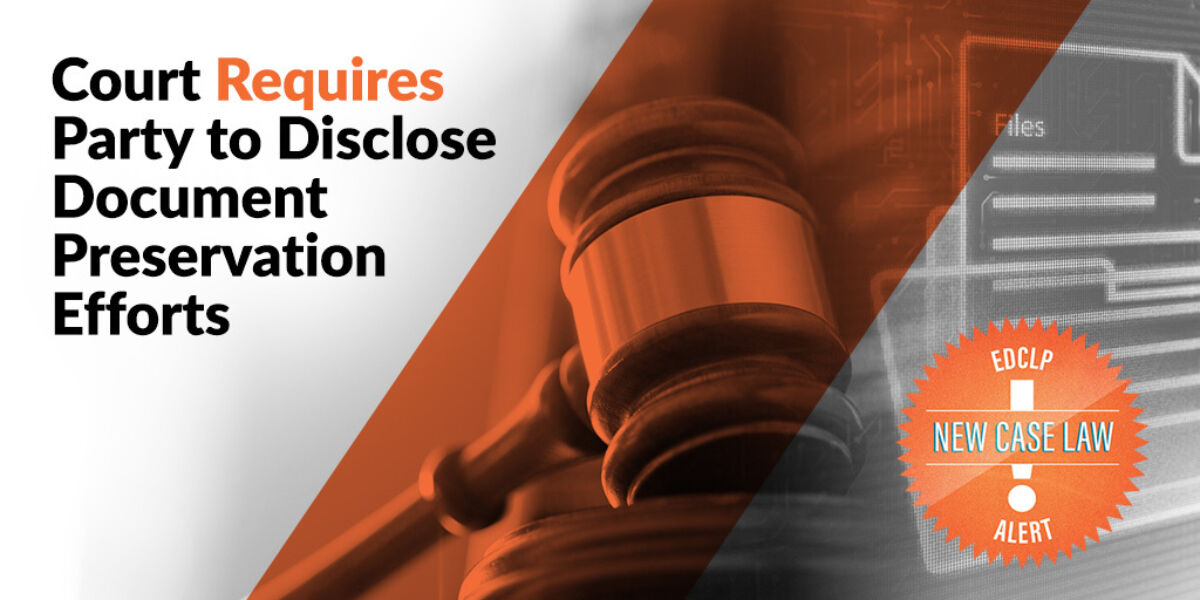E-Discovery
Court Requires Party to Disclose Document Preservation Efforts

Doe LS 340 v. Uber Technologies, Inc. (N.D. Cal. Jan. 29, 2024)
Why This Case is Important
In this case, the court ruled that “basic details of legal hold practices” are not protected by attorney-client privilege, and therefore are subject to discovery, meaning potential parties to litigation must be prepared to demonstrate their preservation efforts.
Case Overview
Plaintiffs in this multidistrict litigation filed suit against ride-sharing company Uber, alleging that it had failed to implement safety measures resulting in drivers sexually harassing and/or assaulting passengers. The various classes of litigants filing suit were consolidated into this federal MDL proceeding.
The court issued a pretrial order requiring document preservation as an interim measure in order to “ensure the preservation of all documents and ESI that may be discoverable in relation to any of the issues in this litigation.” During discovery conferences, it became clear that over 10,000 Uber employees were subject to legal holds unrelated to this litigation; Uber declined to disclose the names of said employees or dates when legal holds were issued.
In addition to requesting a company-wide suspension of document destruction policies, plaintiffs moved to compel Uber to produce about these legal holds, including:
• Names, job titles, and dates of employment
• Dates of hold issue and related litigation
• ESI sources Uber preserved, when it preserved them, and when and how they were used
Case Ruling
- Basic details of a legal hold not privileged. Since basic facts surrounding litigation holds are neither privileged nor subject to the work product doctrine, the court found that plaintiffs were entitled to know how Uber employees were preserving ESI and “the facts of what Uber’s document retention and collection policies are, including the kinds and categories of ESI preserved.” Uber was also required to include whether other legal holds related to cases or complaints about sexual assault or harassment.
- Parties “entitled” to know what ESI is preserved. Courts “routinely hold that parties are entitled to know what kinds and categories of ESI a party has collected and preserved and what specific actions were undertaken to that end.” Therefore, Uber had to disclose information about what sources of ESI it had preserved, when preservation started, when and how ESI sources were used, and the general types of information stored in the source.
- “Exceedingly broad” suspension of document deletion not proportional. Since litigants are not required to preserve all ESI, the principle of proportionality should guide parties as to what ESI to preserve. Since plaintiffs’ request was a company-wide measure, court found it “exceedingly broad and generally disfavored,” and since Uber had already “suspended automatic deletion… for thousands of employee[s],” courts did not find the request proportional to the case.
Case Law Tip
Unsure about the Uniform Spoliation Standard? Exterro has produced an infographic that can help you determine if sanctions might apply. Download it today!
Legal Analysis
This case reiterates what other courts have said: the basic details of legal holds are fair game in discovery. This is limited to dates issued, custodian lists, and the like. Importantly, the Court excludes other details, like how the holds describe the lawsuit, or any specifics relayed by lawyers to their clients. The ruling, because it balances the need for transparency against the need to protect privilege, is part of a trend towards a more-even-handed approache to disclosures, especially when basic disclosures will undermine or buttress the reasonableness of a party's preservation efforts.